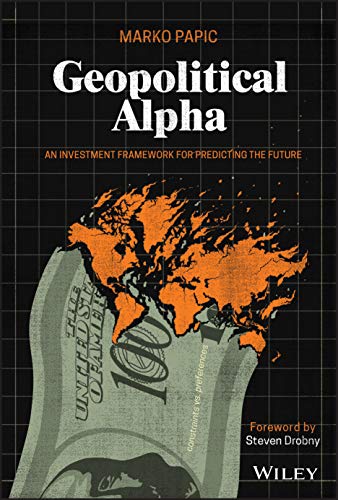

Geopolitical Alpha: An Investment Framework for Predicting the Future
D**D
Great Book to enrich “Geopolitical” themes into an investment decision
I really enjoyed understanding Marko Papic’s constraint framework analysis on geopolitical questions and leading into a net assessment of the situation. I really encourage the reading and going through clear examples explained in the book, demonstrating his approach. Worth a read for any investment professional!
A**W
Interesting thesis, questionable application and writing
The main thesis of this book is useful to contemplate. Papic urges market participants to assess the probability of an event based on the material constraints of decision makers, not what they say, or even what they want. The book is strongest in passages that deal with Draghi, Greece, and the euro crisis, as well as China's policymaking agenda, which often seems opaque and dictatorial but is in fact based on the same material constrains (what the median Chinese citizens expects of the state) as Western democracies, in his view. This is useful knowledge for financial professionals trying to understand how geopolitics and markets interact.Where the book fails to realise its full potential is the post-assessment phase: once you think you have ascertained the material constraints on a decision maker's action, what should you do? Each intersection of finance and geopolitics is so nuanced, so unique and so overwhelmed with information that parsing the noise is incredibly difficult without or without his framework, and to make trades or investments based off only one such perspective seems a stretch. Readers are presented with several examples of where Papic 'called' a geopolitical event: say the overestimation of Bolsonaro and Brazil versus Mexico and Lopez Obrador in FX. The proposed trade was long MXN/BRL, which apparently netted 11.2% in just over a year to 2019. Given that the S&P 500 returned over 30% that year, you'd be forgiven for wondering what all your hard work was for. (Comparing currencies to equities isn't quite fair - I'm just illustrating that for the layman or long term investor, this is book isn't particularly relevant)The trade 'worked', but to make such a decision based off purely geopolitical factors is incredibly risky. The (admittedly abridged) assessment included nothing about the role of each country's central bank, effects of commodity prices on each respective currency, rates of inflation, influence of USD or other currencies, etc. It strikes me that Papic got lucky in that he made the correct geopolitical call while ignoring the other highly complex factors that influence currency moves, fortunate that other non-political events didn't derail his trade over that particular time period. We also hear curiously little about Papic's failures or his proven alpha; as a strategist, surely his firm has the numbers on his value add over and above the market? In other words, does this approach actually have firm quantitative evidence that it works?Then there is the writing style. Personally, I found the book jarring to read. The majority of the book is well written, but it is interspersed with irrelevant personal tangents and anecdotes, or long footnotes that add nothing or actually detract from the flow of the book.I would end by saying that this book is probably worth a read if you're interested in geopolitics and markets, but is unlikely to fundamentally change how you invest. It's mainly written with trading in mind, and if you're a long term, long only investor it's probably not wise to try to generate 'alpha' based on this short-medium term framework.
A**O
A great framework to think about geopolitics
This is a comprehensive and informative introduction to thinking about how geopolitics work - and how leaders think, beyond the news headlines. Investors often misunderstand geopolitical hotspot, leaving room for cooler heads to capture extra opportunities. A pragmatic and constraint-based approach is what works the most, and this book also manages to explain it in an entertaining way.
I**S
Best on Politics-Markets Intersection
The most useful book you will read on applied political science thinking. Ideal for financial market practitioners (such as myself), but also for anyone engaged or interested in policymaking. The "constraint" based framework offered in the book will put you on a different level of understanding (and trying to forecast) policy/politics. And it's super readable, full of interesting anecdotes and historical context.
J**C
Great framework for understanding geopolitics and asset management
Easy-to-understand analytical framework for identifying catalysts, risks and opportunities in global markets. The book is full of personal anecdotes from Papic's unique professional experience and replete with historical examples to support his points. As a student interested in politics and finance, this was a great introduction to global macro investing and provided the tools to conduct my own analyses in future. Highly recommend!
A**E
Perfect Intersection of geopolitics & financial markets
This books provides a great framework for understanding the intersection of politics and finance. It provides more than dry analysis but is filled with personal anecdotes and stories to help the reader understand more the intricacies of global politics and global markets. A must read for anyone wishing to interpret political events worldwide into their portfolio construction. An essential read for the decade ahead and the resurfacing of political analysis.
Trustpilot
1 month ago
2 months ago